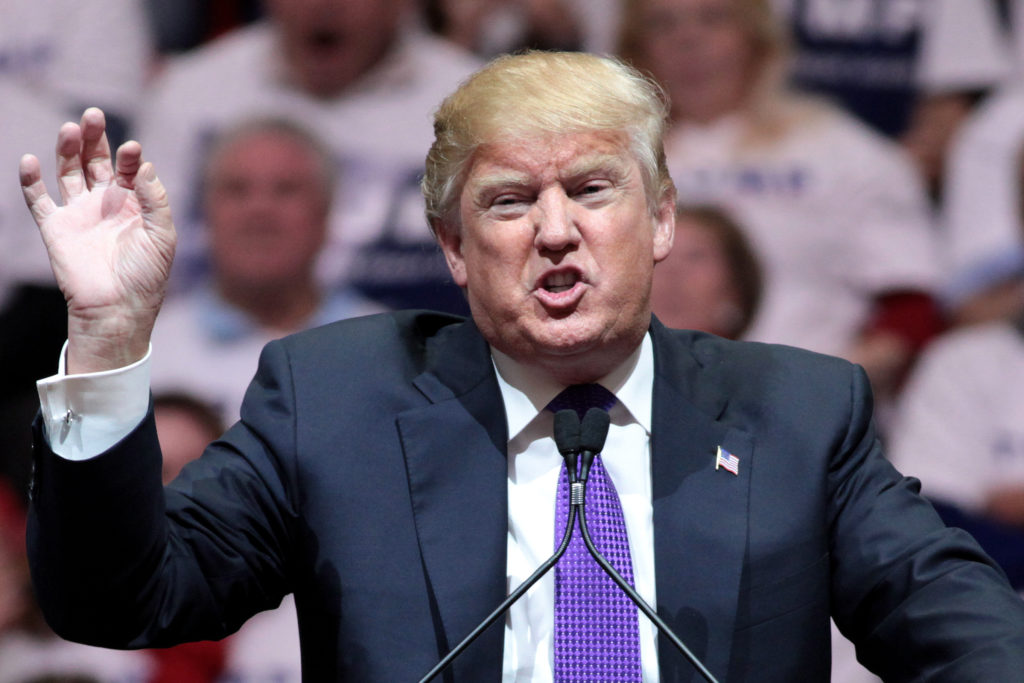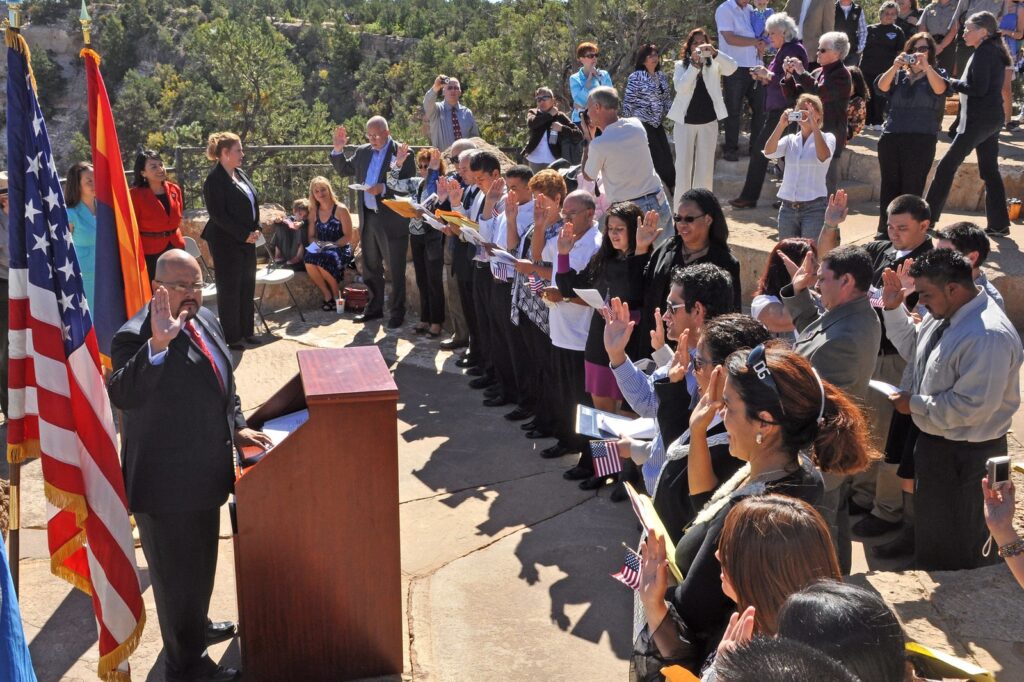
Under Trump’s renewed immigration crackdown, ICE is hiring at record levels blurring the line between patriotism, politics, and persecution. Credit: ICE / Public-Domain.
President Donald Trump’s ICE recruitment campaign amid mass deportations and radicalized raids has sparked debate across borders. The big question relies on whether Trump’s campaign is a genuine national security effort or an anti-inmigrant crusade reshaping America’s identity.
The fact is that in recent months, the U.S. Department of Homeland Security (DHS) has reported a striking surge in the number of Americans applying to join Immigration and Customs Enforcement (ICE). According to DHS Secretary Kristi Noem, the agency has received more than 200,000 applications—a historic record that coincides with one of the most aggressive anti-immigration drives in recent U.S. history. At this point, and under Trump’s renewed immigration crackdown, ICE is hiring at record levels blurring the line between patriotism, politics, and persecution.
The timing is telling. As Donald Trump reasserts his hard-line immigration agenda, mass deportations and forceful raids have become a near-daily occurrence across the country. The administration has framed these operations as necessary to “defend the homeland,” portraying ICE agents as patriotic defenders of national integrity. Yet behind that rhetoric lies a complex reality: one in which recruitment incentives, racial tensions, and political messaging intertwine to define a new chapter in America’s fraught relationship with immigration.
A patriotic call or a political message?
The current recruitment boom is being presented as a patriotic mission. ICE’s official statements emphasize that “Americans are answering their country’s call to serve and help remove murderers, pedophiles, rapists, terrorists, and gang members from our country.” On paper, it sounds like a noble appeal to national security. But the scale and tone of this campaign suggest that something deeper may be at play.
Since returning to the White House, Trump has not only doubled down on border enforcement but has also revived a nationalist narrative that frames undocumented immigrants as an existential threat to the American way of life. In this context, the surge of applications is as much a response to political messaging as it is to patriotism. The recruitment materials are filled with slogans such as “Defend the Homeland” and “Protect America from within.” It is difficult to ignore how these messages echo the anti-immigrant sentiments that have energized parts of Trump’s voter base since 2016.
According to multiple reports, DHS has relaxed age limits, expanded outreach to job fairs and college campuses, and fast-tracked hiring procedures to accommodate the wave of interest. In September 2025, Noem announced that the agency had already extended 18,000 tentative job offers and planned to train thousands of new recruits before the end of the fiscal year. This mass mobilization recalls moments in U.S. history when law enforcement was expanded in times of perceived internal crisis—but this time, the crisis is not terrorism or organized crime. It is immigration.
Critics argue that the administration’s true goal is not simply to strengthen national security, but to institutionalize fear. “They are literally targeting people who are Brown and Black, whether you are undocumented or not,” said Illinois Governor J.B. Pritzker, condemning the recent raids. “They’re indiscriminately grabbing people who don’t look like the ICE agents typically and holding them or mistreating them.” His remarks capture a sentiment that has spread among civil-rights groups: that this new ICE campaign represents not protection, but persecution.
Money, power, and the making of a new enforcement army
The Trump administration has also poured unprecedented financial incentives into ICE’s recruitment drive. Credit: Gage Skidmore / CC BY 2.0.
The ideological appeal of “serving the homeland” is only part of the story. The Trump administration has also poured unprecedented financial incentives into ICE’s recruitment drive. To lure applicants, and according to official data, DHS has offered signing bonuses of up to US$50,000, along with six-figure salaries for specialized roles. Some agents can earn between US$88,000 and US$140,000 a year, before overtime and locality pay. There are also student-loan repayment programs, relocation allowances, and generous overtime pay under the Law Enforcement Availability Pay (LEAP) system.
For many applicants, these numbers are persuasive, especially amid stagnant wages in other federal and private-sector jobs. The administration’s recruitment campaign has effectively turned ICE into one of the most financially attractive law-enforcement employers in the country. The result is a convergence of ideology and opportunity: patriotic messaging wrapped around lucrative compensation.
At this critical juncture in U.S. immigration policy, the generous financial rewards offered to those joining ICE appear to be a clear and deliberate strategy, an effort to build the kind of “army” Trump needs to fulfill his long-standing objectives on immigration, a banner he has proudly carried since the start of his campaign.
Yet these same incentives raise troubling questions. If the government is paying so much to fill ICE’s ranks, is it doing so to protect Americans from genuine threats or to fund a political project that weaponizes fear of the “other”? Civil-rights advocates warn that the rapid hiring pace could erode vetting standards, heighten the risk of abuse, and expand the reach of a force already accused of racial profiling.
Aggressive raids and the racial undercurrent
The practical outcome of this policy is now visible on the streets. Across cities from Texas to Illinois, ICE raids have become larger, more aggressive, and more indiscriminate. Eyewitnesses describe early-morning sweeps where agents enter homes or workplaces without clear warrants, detaining individuals who sometimes turn out to be legal residents or U.S. citizens of Hispanic or African descent.
These raids, critics say, are not just about law enforcement, they are about intimidation. The administration’s rhetoric has blurred the line between undocumented immigrants and entire racialized communities. In neighborhoods with large Latino populations, the mere rumor of an upcoming ICE operation can cause schools to empty and businesses to shutter. The psychological toll is immense: families torn apart, children left without parents, and entire communities living under a state of permanent anxiety.
DHS data indicate that deportations have risen sharply since Trump reinstated his “zero-tolerance” approach. Although official numbers fluctuate, estimates suggest that more than 185,000 deportations have occurred in recent months alone. The administration has announced plans to deport up to one million people annually, a target that would require the kind of personnel expansion now underway. To achieve those numbers, ICE must grow into an army-sized institution—precisely what Trump’s recruitment blitz is building.
At the same time, the violent nature of some raids has fueled growing backlash, even among law-enforcement professionals. Several former DHS officials have expressed concern that ICE’s rapid militarization and politicization could undermine trust in federal institutions. “We’re turning an immigration agency into an ideological instrument,” one former official told The Guardian Newspaper. “It’s less about law and more about spectacle.”
The paradox of America’s immigrant backbone
A new wave of ICE raids under Trump’s immigration policy has ontensified fears among Latino and Black communities, where many say enforcement has turned into open persecución. Credit: Michael Quinn / Grand Canyon National Park / CC BY 2.0.
What makes this shift even more paradoxical is that the United States itself is built on the labor and contributions of immigrants—the very people now being targeted by the administration’s policies. According to official data, immigrant workers make up an estimated 17% of the U.S. labor force, dominating sectors from agriculture and construction to technology and healthcare. Without them, the nation’s economy would face severe disruptions.
Historically, immigration has been one of America’s greatest sources of renewal, both economically and culturally. The country’s innovation, workforce, and demographic vitality depend heavily on newcomers. Yet, the current crackdown seems to ignore this foundational truth. By framing immigration enforcement as a battle for national survival, the administration risks erasing the idea of America as a nation of immigrants and replacing it with a fortress mentality.
This duality lies at the heart of today’s political climate. On one hand, Trump presents his immigration policy as a way to “protect Americans” and ensure “law and order.” On the other, the aggressive tactics and racial overtones of ICE operations suggest an effort to define who truly belongs and who does not. The narrative is no longer about legality; it is about identity.
If the government’s true objective were to enhance security, experts argue, it would invest more in intelligence sharing, asylum processing, and humane immigration management. Instead, billions are being funneled into enforcement manpower, detention facilities, and deportation logistics. This imbalance reveals a deeper motive: the creation of a visible show of strength against a population perceived as foreign, dangerous, and expendable.
Beyond security: A cultural reckoning
The surge in ICE applications is not merely a statistic, it is a mirror reflecting how nationalism, fear, and economic opportunity intersect in contemporary America. Thousands of citizens are volunteering to enforce a vision of the nation that defines safety in terms of exclusion. The danger of this approach is not only its human cost, but its distortion of what national security truly means.
America’s strength has always come from its diversity and openness. But when immigration enforcement becomes a stage for political theater, those values erode. A policy that claims to defend the homeland may, in fact, be dividing it.
As Trump’s ICE recruitment boom accelerates, the country faces a defining question: Is this a genuine effort to make America safer, or a calculated strategy to galvanize an anti-immigrant sentiment that turns neighbor against neighbor? The answer will shape not only the nation’s immigration system, but also the moral fabric of the United States itself.


